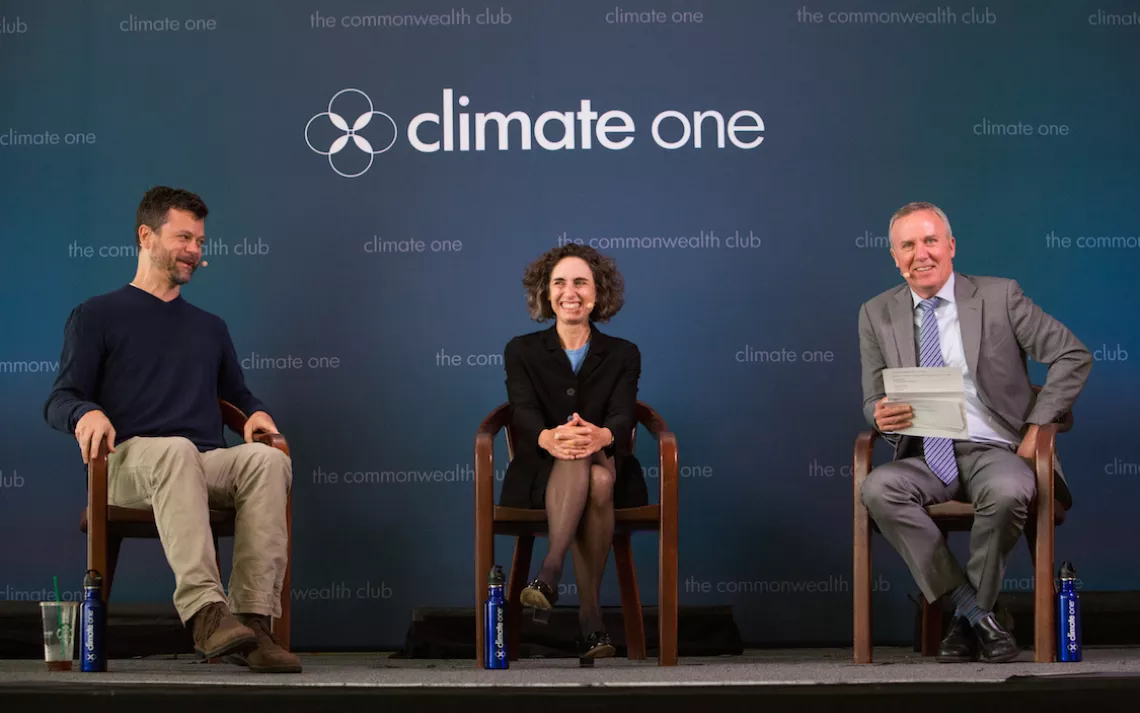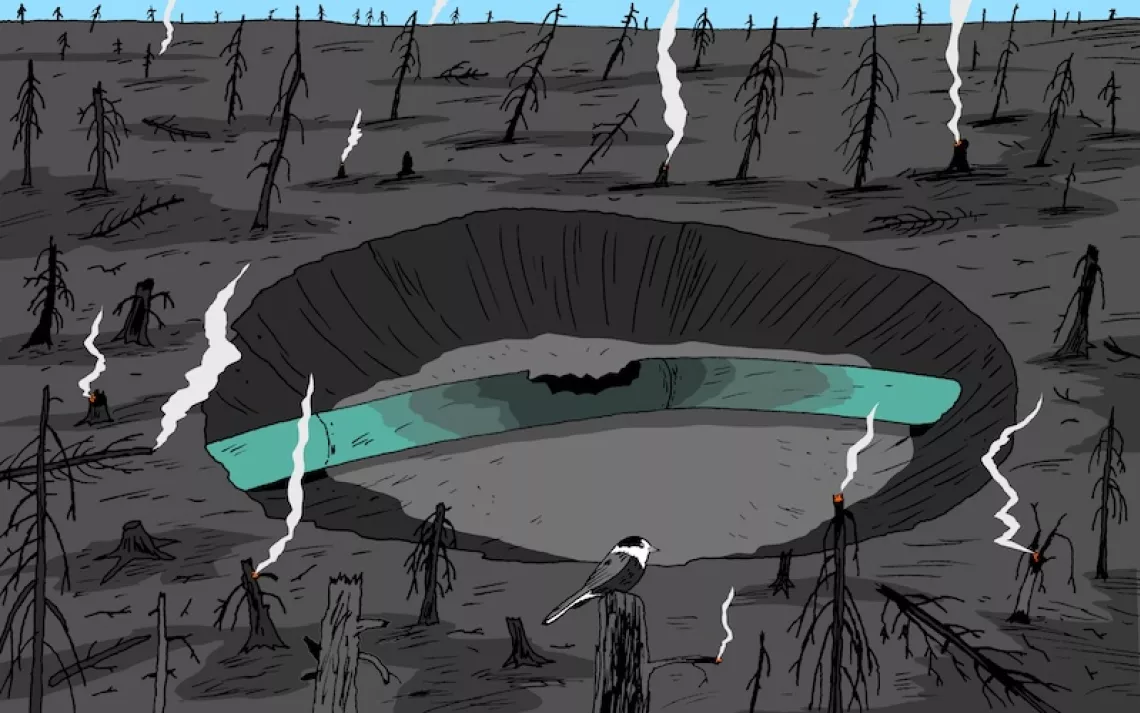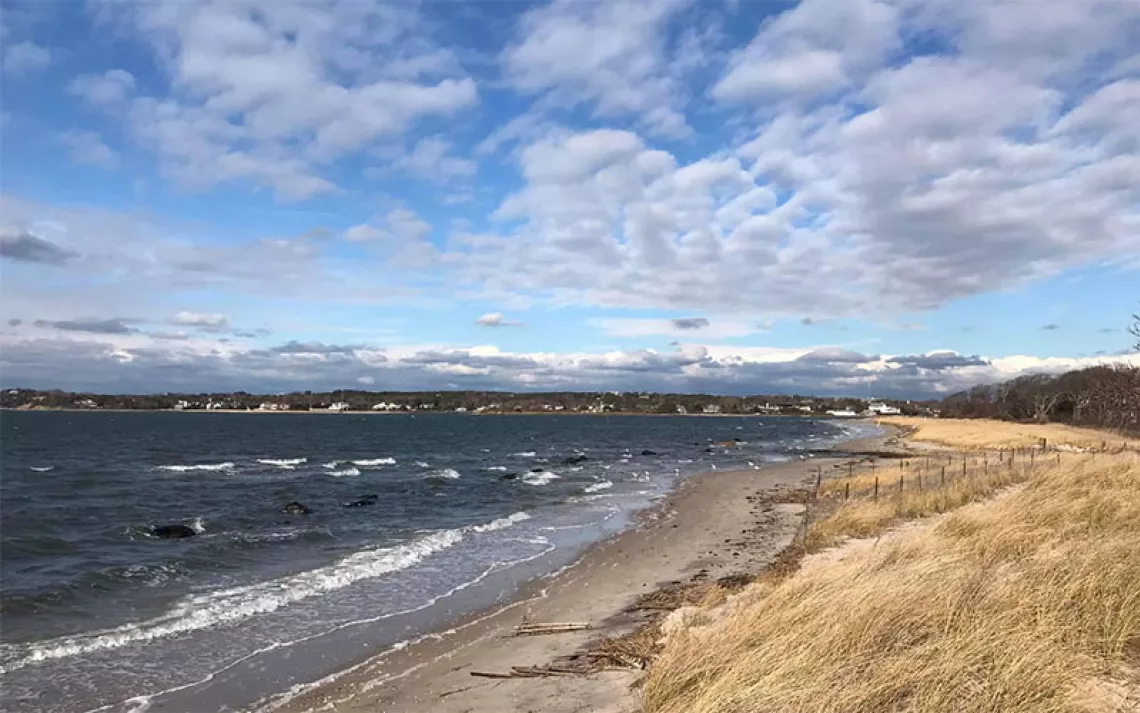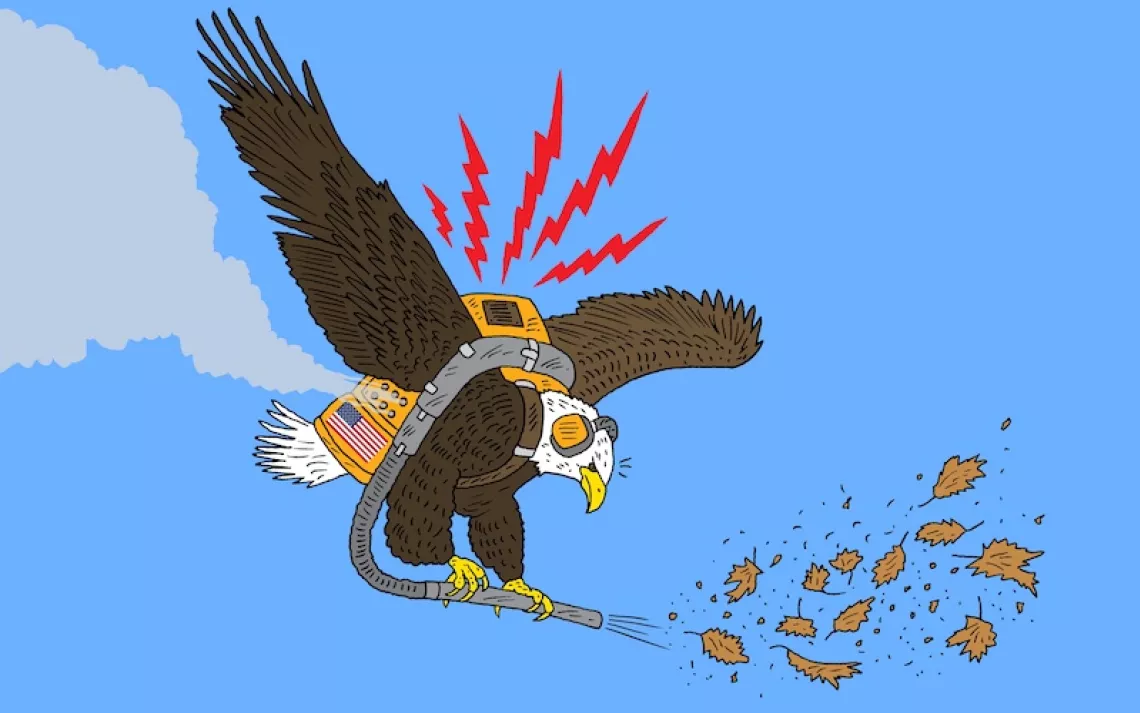How to Act on Climate Change in a Post-Truth World
Veteran environment writer Elizabeth Kolbert sits down with Sierra

What we talk about when we talk about climate change: Longtime New Yorker writer and author Elizabeth Kolbert discusses the topic with Vox writer Dave Roberts and Climate One founder Greg Dalton. | Photo courtesy of Climate One
Shortly after President George W. Bush withdrew the United States from the Kyoto Protocol, longtime New Yorker writer Elizabeth Kolbert decided it was time to get clear on the debate around global warming. “I thought, ‘Either this is a really big deal—in which case it’s being horrifically under-covered—or it isn’t, in which case we could forget about it,” Kolbert says. She set off to Alaska and Greenland, met with top atmospheric scientists, and quickly learned that the vast majority of scientists had arrived at a consensus: Our world was changing. Her resulting three-part series in 2005, “The Climate of Man,” took readers to the front lines of climate change and became the basis of a seminal tome on the topic: Field Notes From a Catastrophe: Man, Nature, and Climate Change (2006).
Field Notes galvanized conversations around climate action, policy, and research. It was also instrumental in creating Climate One, a San Francisco talk show aimed at engaging leaders from business, policy, advocacy, and academic circles in a conversation about stabilizing the earth’s climate and building a sustainable economy. (Founder Greg Dalton, a journalist, started Climate One after an interview with Kolbert prompted him to visit the Arctic and witness the changing climate for himself.) Since then, Kolbert published another influential book, the Pulitzer Award–winning The Sixth Extinction: An Unnatural History (2014), which details why and how human beings have altered life on the planet in ways no species has before.
More than a decade after their first interview, Kolbert met with Dalton again last week at the Climate One headquarters, within the Commonwealth Club of San Francisco. She sat onstage alongside fellow veteran climate reporter Dave Roberts (formerly of Grist, now writing for Vox), for a televised conversation about environmental journalism in a post-truth world where climate-denialism is on the rise.
“We’ve already met the enemy, and he’s all of us,” Kolbert said during an interview with Sierra before the event. At the time, Maria was spinning toward Puerto Rico, and Texans and Floridians were still reeling from Harvey and Irma.
*
Sierra: In Field Notes From a Catastrophe, you discuss turbulent natural forces that have shaped previous human civilizations with a NASA scientist. You quote him saying, “We may say that we’re more technologically able than earlier societies. But one thing about climate change is it’s potentially geopolitically destabilizing. And we’re not only more technologically able; we’re more technologically able destructively as well.” Can you talk about the ways in which technology is helping humanity to address climate change, and the ways in which it isn’t?
Elizabeth Kolbert: Right now we’re sort of only addressing climate change through technology. It comes down to two schools of thought: One is that we can keep doing everything we’re doing now, just with different technologies. The other is that we’ll have to live differently, with maybe much less technology—that we can’t just solar-power everything and call it a day. I tend to fall into the “We can’t just keep doing what we’re doing but actually have to change the way we live” category, but then I also don’t have a mechanism to get from here to there.
In any case, right now I think it’s pretty clear that we’re only pursuing the former, tech-reliant strategy and that we’re not even pursuing that very accurately. I mean, look out on the street—most people are still driving cars with internal combustion engines, even here in California, which has done as much as any place in the United States. Nothing very dramatic has changed. So, I don’t know an answer.
The other point of that quote was that, really, at the end of the day—and this is sadly all too relevant right now—most major countries have nuclear weapons, and that if things get ugly, they’ll use them. At the time I wrote that, it seemed way out there, but now it doesn’t. So I think this nativist, national moment we seemed to be in is contributing to all sorts of potential crises around the globe—climate-related and not.
What do you think it would take to get people to pursue the second school of thought and live with a lot less technology?
Absolute disaster. I don’t think voluntary simplicity is going to happen. Some committed people are doing that, but for the vast majority of people, that’s not happening. Our whole economy is built around more stuff, and more services, and more technology.
In “Who Owns the Internet?”—your recent New Yorker piece on the effects of big tech companies’ digital monopolies and the curious currency that “going viral” carries—one of your sources states, “Trump began as Cecil the Lion and then ended up president of the United States.” Is there a positive way, do you think, to make climate action go viral?
Certainly the social entrepreneur types ought to be thinking about that, because it’s potentially very powerful. But you’re also talking about effecting huge structural changes in our economy and in our energy systems—the way we do everything. So, it’s never going to be enough. I mean, there are campaigns to get people to ditch their cars and just bike, but because of the way the country’s set up, that’s not practical for a lot of Americans—we need cities that are more walkable and bikeable. You do see bike-sharing programs gaining great traction online, though, so I think that finding more ways to make emitting CO2 uncool is a great direction to tread in.
Can you talk about climate change skepticism in the age of Bush versus the age of Trump? While 75 percent or more of the general public now accepts global warming as reality, politicians have become more vociferously skeptical. Why do you think this is the case?
I think there’s only one way to explain it, and it’s a very depressing commentary on our government: At this point, it’s basically bought by the fossil fuel industry. When I was going around the globe researching Field Notes, there were still scientists who’d say, “Well, we don’t really see the signal emerging from the noise yet.” Now, the signal has very clearly emerged from the noise; there’s just no one out there who’s honest and who’s saying anything except, “Whoa, this is serious and getting more serious by the minute.”
So, the fact is that we have a lot of people—people almost exclusively in one party, which is no coincidence—who get a lot of money from fossil fuel interests. And then it becomes a little more circular, too. Because you’ve fed this line to your constituents and your constituents don’t necessarily want to hear you change your mind, so it’s a really bad situation, and the human psyche being what it is, I don’t see [Texas representative] Lamar Smith or [Oklahoma senator] James Inhofe suddenly turning around and saying, “You know? I was wrong about that.” I think they are going to have to be either voted out or age out of the system. But you know, this becomes very partisan very quickly, and the direction that the Republican party is taking under Donald Trump is much different than what I observed under Bush. It’s become this anti-evidence, anti-fact party—and that’s a really frightening new development.
Are you confident that once the Lamar Smiths of the world phase out, the next generation will be less likely to put climate change deniers in power?
As people feel the impacts of climate change more and more, they’re demanding answers, and the system is going to have to respond. How exactly it will respond I can’t say, because you’d think they would’ve had to respond to facts on the ground a long time ago. And yet, I just read another piece about the Trump administration taking climate change discussions off another website. It’s completely Orwellian; you wouldn’t think it’s possible in 2017. Yet, it’s happening on a larger scale than ever.
But at the same time, we’re hearing rumblings in places like Florida, where the water is bubbling up over the sidewalks, and where a bunch of people, including Republicans, have signed onto climate action pacts. And of course, a lot of scientists are becoming more outspoken, with open letters and petitions. But that gets back to the “anti-fact” problem. Science is now considered this disparate arena—to many people, it’s just another form of propaganda. And when you get into that dynamic, I don’t know how you get out of it.
You reported extensively on Hurricane Katrina. In fact, one of your key arguments from Field Notes was that governments have the knowledge and technology to prepare for such disasters but choose to ignore the signs until it’s too late. Now that you’ve also written about Harvey and Irma, I’m curious as to whether any aspect of our national disaster preparedness or response, this time around, gave you hope.
Not really. In the case of Harvey, Houston was shockingly ill-prepared. They’d filled in a lot of wetlands, developed places where they shouldn’t have developed, etc. And I think Florida got lucky—if they’d taken a more direct hit, we’d be having a different conversation. Now, we’re having a conversation about rebuilding, and these decisions tend to get made on a really ad hoc level. You have people saying, “My house was here, and I want my house back,” and then those houses just get rebuilt. But as a public, we should be much more demanding of a more sane national flood insurance program, and more sane energy policies. These problems tend to come down to people whose interests are very clear and apparent—fossil fuel companies, and people whose houses are being destroyed by storms. They’re the ones doing the lobbying.
During the storms, many powerful climate change skeptics, including the EPA’s Scott Pruitt, insisted that it wasn’t an appropriate time to talk about climate change. Do you think all these storms will at least spur some important conversations?
I think that in this particular case, when you have powerful hurricanes, one after the other—and we aren’t done with the season; we don’t know what else is going to happen—that argument becomes untenable really quickly. Ron Klain, former chief of staff to Al Gore and Joe Biden, had that great tweet about when Scott Pruitt thinks it’s OK to talk about climate change [Before a major hurricane? “No! We are focused on preparation”; During a major hurricane? “No! We are all about the storm”; After a major hurricane? “No! We are working on recovery”; Between major hurricanes? “Ha! What climate change? If it were real, we’d be having a major hurricane right now”], so this strategy of avoidance is becoming increasingly obvious and cynical.
Your writing does a great job of making climate science accessible to a more mainstream audience. What are some of your secrets to dispersing the message?
I don’t think I make it so graspable—I spend a lot of time preaching to the converted. I don’t think Lamar Smith is reading what I write or taking it to heart, so I think we need some different messengers. Texas climate scientist Katherine Hayhoe, for instance, is a great one. But we need the generals to step forward. We need the Pentagon to talk about climate change as a major, geopolitically destabilizing force. Because it’s not going to be me, or Al Gore, or Leonardo DiCaprio, who’s going to get the message across at this point. Ultimately, it’s going to have to come down to the people the deniers are listening to—right-wing media and religious figures, for instance—changing their tune. Those are the guys that can actually change the course.
 The Magazine of The Sierra Club
The Magazine of The Sierra Club






